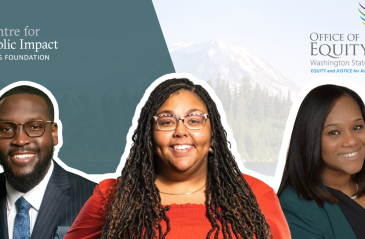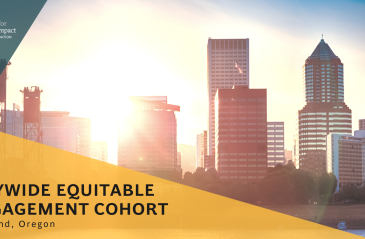
Five things we recently learned about difficult conversations

The UK is celebrating National Inclusion Week this week #NIW2018, but does your government represent you and society? #FindingLegitimacy
Share articleCommunities overwhelmingly feel disconnected from, and unrepresented by, the people who make decisions on their behalf. #FindingLegitimacy
Share articleAuthentic representation goes well beyond gender & ethnicity. It must include perspectives on sexuality, religion, education, age and more.
Share articleWe put our vision for government into practice through learning partner projects that align with our values and help reimagine government so that it works for everyone.
The UK is celebrating National Inclusion Week this week. It's a remarkable progress in itself that such a week exists. Not to put a downer on the celebrations, I would like you to take a look at the face of UK politics in 2017 that Giuseppe Sollazzo calculated. The average face of all 650 British MPs is sadly and predictably still male and white. Before we take a closer look at the average composition of the UK population and its current representation in government, we should ask ourselves - do we even need a representative government that accurately reflects society?
The average face of a UK Member of Parliament by Giuseppe Sollazzo.
The work on legitimacy at the Centre for Public Impact (CPI) shows that the relationship between governments and communities around the world is at breaking point. Communities overwhelmingly feel disconnected from, and unrepresented by, the people who make decisions on their behalf - both the political class and the public administration. The CPI has outlined five behaviours for a more human government that serve to strengthen government legitimacy. One of these elements is that governments have to build an authentic connection with their communities. However, what does that really mean?
To build this kind of connection, government representatives need to be approachable, so that communities can relate to them. It needs to be clear that those in power are listening to the people they represent, that communities feel their voices are heard - and taken seriously as well! This need for an authentic connection is also reflected in academia, where studies from the US suggest that when communities can identify with the people who represent them, the result is less alienation, higher voter turnout, and greater engagement with politics.
Coming back to Sollazzo's average face of an MP in the UK, we know how important faces are in politics: the publicly displayed faces of politicians shape voters' decisions and can encourage people to participate in elections (or discourage them from doing so) or even aspire to stand for election themselves. This is why we need diverse role models at all levels of power, but particularly at the top. Now, let's face it: how much diversity is there in the UK government? Answer: it's not looking too good.
To help us think about whether the people who shape the political decisions - and therefore the lives of all of us - are as diverse as the people they represent, I've put together an overview of the diversity in the UK government in terms of gender and ethnicity:
Representation
Women
People from ethnic minorities
Overall population
Cabinet ministers
House of Commons
House of Lords
Civil service
Senior civil service
Gender and ethnic minorities representation in the UK in 2017
The year 2018 marks not only the centenary of the success of the suffragettes but also the 70th anniversary of the arrival of the “Windrush generation” in the UK. How can it be that, in 2018, government institutions perform so poorly in terms of representing gender and ethnic minorities? Although Sollazzo's average face speaks only for the House of Commons, you can see the glaring underrepresentation of women and ethnic minorities throughout all government institutions - except one.
The civil service performs much better in representing society in terms of gender and ethnic minorities. The average face of a civil servant would look different from the MP's. It is important to remember, however, that this more accurate representation of society in the civil service did not happen by accident. Instead, it is the result of a concrete strategy by civil service leadership to increase diversity.
Part of this diversity and inclusion strategy is, for example, to report meticulously on the changes in the representation of minority groups within the civil service. Another tangible step was the introduction of programmes such as the Summer Diversity Internship. The difference in representation between the entire civil service and the senior civil service shows that there is still a long way to go, but with continual efforts to make the civil service look and feel more attractive at the most senior levels, and with a continual effort invested in building the pipeline of talent, things will start to improve.
At the recent OneTeamGov event in London, there was a discussion of diversity in the civil service. It emphasised that authentic representation goes well beyond gender and ethnicity and must include perspectives on sexuality, religion, education, age, disabilities and other factors. This analysis is particularly important, because people hardly ever fall into neat, clear-cut groups, but are rather part of several overlapping and mutually reinforcing categories. A profound intersectional analysis is beyond the scope of this blog, but the main point is this: the UK is made up of rich and diverse communities, and an authentic government should represent the extremely varied collection of voices. Only then can government begin to strengthen its relationship with communities and build legitimacy.
But what are your own perspectives on this issue? What does it mean to you to have an authentic connection with government? Do you think that the institutions representing you need to be more diverse? Please don't hesitate to contact CPI at legitimacy@centreforpublicimpact.org.
Why remaking public policy in the 21st century will be less technical and more human. Governments need to move from relying on technical solutions to those which are more human, suggests Elena Bagnera
Government must be made more human or risk becoming irrelevant - our new report shows how #FindingLegitimacy. Nadine Smith reports on CPI's new report on finding the human in government
Becoming a more human government - five behaviours for greater legitimacy. Magdalena Kuenkel reports on CPI's new report on how governments can change their behavior to strengthen their legitimacy
Competence, fairness, and caring - the three keys to government legitimacy. UCL's Amanda Greene pinpoints competence, fairness, and caring as key factors in helping governments secure their legitimacy.











